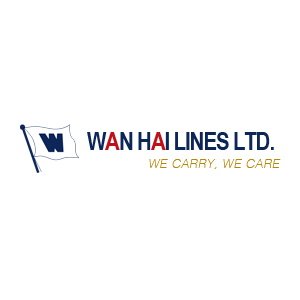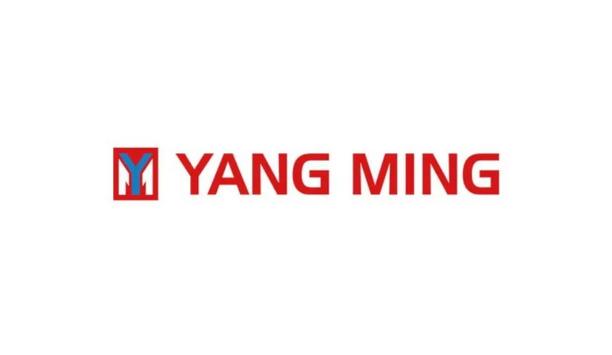Wan Hai Line Ltd - Experts & Thought Leaders
Latest Wan Hai Line Ltd news & announcements
Pacific International Lines (PIL) is pleased to introduce a new weekly direct service linking China and Korea with four key countries in South America - Mexico, Guatemala, Colombia and Chile. The new service, known as West Coast South America 6 (WS6), will commence on 13 July 2022 from Ningbo, China. West Coast South America 6 (WS6) West Coast South America 6 (WS6) aims to augment PIL’s existing two services - WS2 and WSA West Coast South America 6 (WS6) aims to augment PIL’s existing two services - WS2 and WSA, strengthening Pacific International Lines’ connectivity into Colombia and Chile. It will be served by a consortium of ten vessels with an average effective capacity of about 3,300 TEUs, jointly deployed by Pacific International Lines (PIL), Wan Hai Lines and Yang Ming Lines. Tonnie Lim, the Chief Trade Officer at Pacific International Lines (PIL), said “We are launching this new WS6 service to broaden PIL’s presence in West Coast South America, and capitalise on the growth potential of the Latin American region. This is also part of PIL’s efforts to meet the needs of its customers worldwide for a more comprehensive coverage in Central and South America.” The ports of call for the West Coast South America 6 (WS6) service are: Ningbo – Shanghai – Qingdao – Pusan – Manzanillo – Lazaro Cardenas – Puerto Quetzal – Buenaventura – Valparaiso – Ningbo
Yang Ming Marine Transport Corp. is delighted to announce the launch of its latest Far East-West Coast of Latin America service in July 2022. The new service will offer customers broader service coverage and ensure more reliable services in the FE-WCSA trade. The new SA8 service is jointly operated by Yang Ming, WAN HAI LINES LTD., and Pacific International Lines Pte Ltd (PIL). A fleet of eight 2,400-3,700 TEU vessels will be deployed on the weekly service, two of them are from Yang Ming. The first sailing of the SA8 service is planned to commence from Ningbo on 13th July, 2022(ETB). A round trip will take 70 days. Existing service network Yang Ming currently provides two FE-WCSA loops, SA4 and SA6. With the addition of the SA8 service, the Company will be able to strengthen its existing service network and provide customers with more comprehensive delivery services across FE-WCSA markets. Please find below port rotation details of Yang Ming’s FE-WCSA services: SA4 port rotation: Hong Kong - Yantian - Kaohsiung - Shanghai - Ningbo - Manzanillo - Balboa - Buenaventura - Callao - San Antonio - Hong Kong. SA6 port rotation: Kaohsiung - Shekou - Hong Kong - Ningbo - Shanghai - Manzanillo - Lazaro Cardenas - Puerto Quetzal - Callao - Guayaquil - Manzanillo - Pusan – Kaohsiung. SA8 port rotation: Ningbo - Shanghai - Qingdao - Pusan - Manzanillo - Lazaro Cardenas - Puerto Quetzal - Buenaventura - Valparaiso – Ningbo.
The Lloyd’s Register Maritime Decarbonisation Hub and partners launch ‘The Silk Alliance’ to develop a Green Corridor Cluster beginning with intra-Asia container trade. The Silk Alliance seeks to develop a fleet-specific fuel transition strategy for container ships operating in Singapore and wider Asia. The Lloyd’s Register Maritime Decarbonisation Hub is working with 11 cross-supply chain stakeholders to develop a fleet fuel transition strategy that can enable the establishment of a highly scalable Green Corridor Cluster. Fuel transition strategy Initiated by the Lloyd's Register Maritime Decarbonisation Hub, The Silk Alliance brings together a diverse group of organisations whose collaboration can advance the decarbonisation of the maritime industry. The Lloyd’s Register Maritime Decarbonisation Hub is working with 11 cross-supply chain stakeholders These include shipowners, such as MSC Shipmanagement Ltd., Pacific International Lines (Pte) Ltd, Wan Hai Lines, X-Press Feeders, Yang Ming Marine Transport Corp.; shipyard, Keppel Offshore & Marine Ltd (Keppel O&M); bunker logistical supplier, Singfar International; engine manufacturer, Wärtsilä; ship manager, Wilhelmsen Ship Management; and financial institutions, the Asian Development Bank and ING. Demonstrating tangible actions At the outset, these members will collaborate to send an aggregated demand signal for other stakeholders such as fuel providers, port operators, and governments to support the Green Corridor Cluster. The Silk Alliance members will draw from their individual areas of expertise to develop a fleet-specific fuel transition strategy for container ships operating primarily in Asia, based on the Lloyd’s Register Maritime Decarbonisation Hub’s First Mover Framework. This is designed to strengthen leadership and foster collaboration in the maritime industry to meet its COP26 commitments and to demonstrate tangible actions that can lower the investment risk that is currently preventing the wider uptake of sustainable carbon-neutral fuels. Incorporating new technologies The cross-supply chain collaboration is dedicated to delivering learnings to enable sustainable marine transport The initiative is named after the maritime section of the historic Silk Road, linking Southeast Asia to China, the Indian subcontinent and the Arabian Peninsula, which expanded over the course of centuries to incorporate new technologies and cultures. The cross-supply chain collaboration is dedicated to delivering learnings to enable safe, commercially viable and sustainable marine transport in support of the industry’s long-term strategy to decarbonise international shipping by 2050. Charles Haskell, Lloyd Register’s Decarbonisation Programme Manager, commented, “This is a first-of-its-kind in developing fleet transition strategies for multiple stakeholders, not just with the support of major players within the maritime industry, but also with operators in other industries that serve the maritime supply network – the shipowners, shipyard managers, financial institutions, bunker suppliers and engine manufacturers.” Fleet-specific decarbonisation strategy “The Silk Alliance aims to establish a fleet-specific decarbonisation strategy and green corridor implementation plan that encompasses key links in the maritime supply network which are critical to providing maritime players of all sizes with the resources to transition to carbon-neutral fuels and vessels.” The Silk Alliance aims to establish a fleet-specific decarbonisation strategy" Mr Goh Chung Hun, General Manager, Fleet, PIL said, “PIL is happy to be a member of The Silk Alliance, as we are a key proponent of the multi-stakeholder collective approach to developing an effective and feasible decarbonisation strategy for the shipping industry. We hope that through our participation in The Silk Alliance, we can demonstrate our commitment to decarbonising our fleet, and at the same time working with other stakeholders to establish regional green corridors for feeder shipping utilising low carbon fuel or technology.” Improving energy efficiency Mr Aziz Merchant, Executive Director of Keppel Marine and Deepwater Technology, the technology arm of Keppel O&M, said, “We are committed to play a role in the decarbonisation of the maritime industry.” “As the shipyard partner in The Silk Alliance, Keppel O&M is pleased to contribute its deep engineering expertise in vessel design and operations, as well as extensive experience in vessel upgrading, which can help shipowners and managers improve the energy efficiency and carbon intensity of their fleets and operations. Keppel O&M is also working on end-to-end solutions for the development and adoption of greener marine fuels, which will further support The Silk Alliance in achieving its objectives.” Greener marine fuels ING prides itself on being a sustainability pioneer and is an original signatory to the Poseidon Principles" Carl Schou – CEO and President of Wilhelmsen Ship Management said “The Silk Alliance presents an opportunity for the industry to leapfrog the progress of fuel transition. We are looking forward to contributing our ship management and crewing expertise in the development of this transition strategy. We hope to aggregate the people factor calculated into the heart of this transition.” Ms Anju Abrol, ING’s head of Wholesale Banking APAC, said: “ING prides itself on being a sustainability pioneer and is an original signatory to the Poseidon Principles, a framework for integrating climate considerations into lending decisions to advance international shipping’s decarbonisation.” Low-carbon fuel option “The Silk Alliance marks a further and necessary step in that decarbonisation journey and we are heartened to join key stakeholders from across the value chain. We look forward to working with all of them to take on this challenge and to make it happen.” Yang Ming Marine Transport Corp. said: “We have been dedicated to environmental sustainability and always go beyond mere regulatory compliance. In order to develop reliable fleet transition strategy to reduce both carbon and GHG emission for mid and long term, we will need assistance from different platforms that could help us explore the most realistic way to reach the target of decarbonisation. Yang Ming is pleased to participate in The Silk Alliance to enhance our commitment to decarbonising our fleet, which has been evidently demonstrated through our upcoming plan to build five 15,000 TEU vessels with greener and low-carbon fuel option.”





